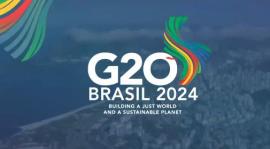
By Gabisile Ngcobo
Rio de Janeiro - South Africa’s participation in the Group of Twenty (G20) reaffirms the country’s values enshrined in the Constitution and, given the ongoing global geopolitical tensions, every effort to foster cooperation must be pursued.
This is according to Research Professor of International Politics at the University of South Africa (Unisa) Jo-Ansie van Wyk.
The G20 is a group of developed and emerging market economies that are dedicated to promoting economic cooperation, environmental sustainability, social inclusion and global equity.
“These are values that South Africa has enshrined in its foreign policy and, of course, are enshrined in our Constitution.
“For South Africans, our government’s participation is a reconfirmation of these values. Therefore, we can hold government democratically accountable if there is a disjuncture between its domestic and foreign policies,” she told SAnews.
She said the summit was an opportunity for leaders to engage with their peers and counterparts.
“These intergovernmental forums express a commitment to and the practice of global cooperation, rather than conflict. It offers states an opportunity to address matters of mutual concern, share responsibilities and serve as a communication medium to foster further international cooperation.”
On November 18 and 19, leaders of the G20 nations will meet in Rio de Janeiro to discuss an agenda set by Brazil, with the African Union (AU) participating as a full member for the first time.
Read I President arrives in Brazil to lead SA’s participation at G20 Summit
According to Van Wyk, this means that the Global South and the AU have an important task to communicate their needs and positions for the first time.
“Moreover, it is an opportunity to bring our resources as limited as they are to the table. We have, for example, excellent diplomats and astute businesspeople. Therefore, the Global South should promote the message it offers to global cooperation.”
She urged the Global South to negotiate mutually beneficial commitments and agreements.
In addition, the Global South must ensure that at each state’s domestic level, it complies with good governance and human rights, she said.
“This will add to our status when we speak at these forums. In this way, we can hold the Global North accountable to the same standards.”
Van Wyk argued that gatherings like the G20 and BRICS Summits serve their purpose, emphasising that diplomacy is an ongoing process rather than a one-time event, such as signing an agreement.
“It takes time for states to adjust to new ideas and domesticate new ideas and agreements due to each state’s unique constitutional system. Moreover, governments come and go, but states do not.”
BRICS stands for a group of significant emerging-market nations: Brazil, Russia, India, China, and South Africa.
Recently, additional countries have joined the group, which now represents an increasing share of the global economy.
She emphasised that a significant outcome of BRICS+ is its expansion, along with its formalisation and institutionalisation through the New Development Bank, summits, and interactions among academics and business professionals.
She cited Eskom, which has benefitted from a loan from this new bank.
Reports indicate that the bank approved a R18 billion loan to enhance water and sanitation services in South Africa, along with a R5 billion loan to support Transnet’s recovery program.
However, the Professor explained that the outcomes of these summits are often aligned with states’ existing international commitments at bilateral and multilateral levels.
She said past G20 Summits achieved tangible results. This includes South Africa joining the intergovernmental forum and the historic inclusion of the AU.
“All these developments are concretely giving South Africa and the AU a seat at the table.”
Last year, government faced criticism for spending R180 million on the BRICS Summit, which some referred to as a “talk shop”.
The Professor recognised that intergovernmental gatherings and summits are expensive; therefore, their outcomes must be concrete and align with South African interests.
“Our economy is not growing as expected, investment is not flowing in as expected, state capture has depleted the fiscus and DIRCO’s [Department of International Relations and Cooperation] budget is not sufficient to realise all our foreign policy ideals, commitments and responsibilities.
“Therefore, it is very important that South Africans experience these summits as beneficial to us.”
She emphasised that if funds are allocated for this purpose, equal amounts must also be directed towards domestic needs.
“This is difficult. Besides the status and prestige value of hosting the summit, we will be able to host world leaders and benefit from cooperation. Therefore, South Africa’s Presidency must be innovative, produce tangible results and grip the imagination of South Africans.” – SAnews.gov.za


